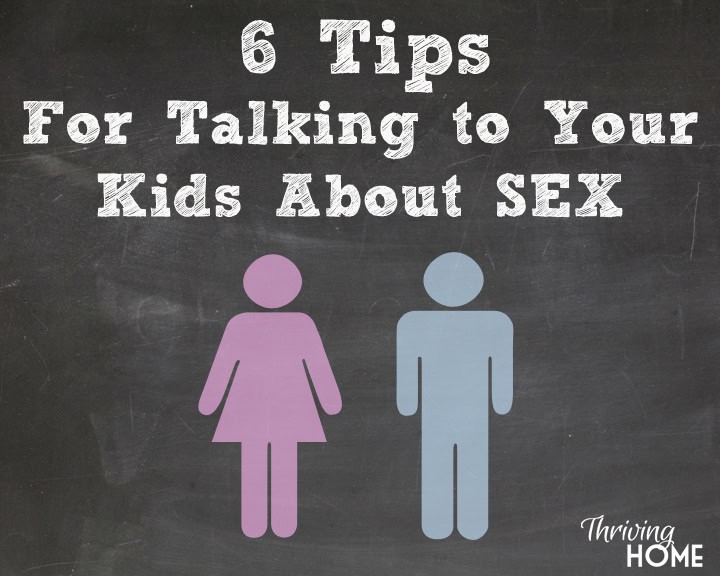6 Tips for Talking to Your Kids About Sex
Guest post by Nathan, Rachel’s husband
Rachel and I are the parents of three kids, and though the oldest is just starting second grade, we’ve been occasionally discussing how to talk with our kids about sex. In fact, it might be better to say that we’ve been discussing how to continue talking to them about the subject (more on this below).
To be sure, we’re not having or even planning a comprehensive conversation with them anytime soon (more on this below as well), but we are trying to think through how to approach the whole issue now and as our kids get older.
If you’re wondering if we’re jumping the gun with our kids about sex, I’m not sure whether you’ve been paying enough attention–to our culture that is. Kids in our culture are exposed to sex and sensuality earlier and more often than ever before. And this is apart from all the naturally inquisitive questions that kids tend to raise at any age (you guessed it: more below).
My wife and I haven’t figured it all out. Not even close.
So while my wife and I will probably never be qualified to write a book and start scheduling seminar tours, I did recently run across an article from Mollie Hemmingway that I found to be full of good, practical advice. Here are six of Hemmingway’s points for talking to your kids about sex along with excerpts, but I really encourage you to read the whole thing.
1. Don’t Have “The Talk”
“Yes, the first piece of advice about having “The Talk” is not to have it. That’s because instead of a single talk, you have an unending conversation over the course of your child’s entire life. It may sound difficult but it’s actually quite easy. Think of it like you think of any other issue on which you inculcate values. You don’t wait until your son is 19 to tell him to consider safe driving.”
“…It’s more about an unending conversation involving body parts, emotional navigation, long-term plans, your family’s values, and more. Except that makes it sound like you’re talking about it all the time and really you’re just talking about it when it needs to be talked about.”
2. Partly be proactive, partly be responsive.
“A lot of talking about sex with your children is just answering the questions they have. If they have the question, you can certainly do the parental duty of letting ‘em know what’s what. This doesn’t mean that if your 4-year-old asks you about how babies are made, you explain to them the entirety of human physiology and marriage norms—just that you need to figure out an age-appropriate answer.
On the other hand, sometimes kids need to be made aware of things they might not inquire about on their own.”
3. Sometimes it’s good to ask why they want to know something.
“I learned this trick from an older friend of mine and it’s come in handy so many times. …No need to go on and on without first learning what your child actually is hoping to have answered.”
4. Mechanics aren’t the hard part. Neither is the emotional part. Transmitting your morals is.
“It’s not just about persistent instruction in what you value, it’s about behaving in a manner that is not completely at odds with what you proclaim. Part of it is realizing that being a parent means you are in the business of inculcating morals. I know, it sounds so judgmental. Take deep breaths and realize that everyone has strong ideas about what is right behavior and what is wrong behavior. Don’t believe the lie that some people are moralistic and some aren’t. Every single person on earth is doctrinal in their sexual morality, whether that morality is that sex is a gift from God to be enjoyed within marriage or whether it’s that sex should have no limits beyond safe-words and safety restraints and maybe-bestiality-isn’t-cool-but maybe-it-is-who-knows-the-important-part-is-that-you’re-having-fun-and-using-birth-control-and-not-having-babies-until-your-late-30s.”
5. Love your spouse. View sex as a blessing.
“One of the best things parents can do to help their kids develop a healthy attitude toward sex is to demonstrate that they themselves have a healthy attitude toward sex. And since it’s really hard to fake happiness with a crappy sex life, that means having a loving marriage with lots of sex. Take the time to have fun time with your spouse and make sure your spouse is a priority over your children.”
6. Be positive about sex.
“So much of talking about sex is about curbing or redirecting behavior (e.g. “we don’t do that in public” or “we don’t use force” or “we don’t develop a clown fetish.”) that it’s also good to talk about what we should do. And one of those things is enjoy sex.”
Reader Question: Have you found any books or resources to be helpful in giving your children a biblical view of sex? Please share below.
About the Author


Leave a Comment